101 Ways of Starting an ISP:* No. 53 – Conversation, Content and Weird Fiction
-
RAW
Surfatial
3 August 2016
* ISP stands for Internal Surface Provider.
Mainstream institutions for learning, as we see them, are not concerned with the substance and gravityof the present moment [B1]. The professing of experience to aid learning or skill development is largely a perverted claim. There is no actual intention of enabling, nor is there even a desire to personally experience any immersion or penetration [B2]. Added to this is the spectre of commodification of experience and learning today, where education has turned into a consumer product. The ivory tower of aloofness is too comfortable to deviate from. The institutionalisation of aloof posturing and the masks of professorships are too smugly fitting the exhausted bodies of those running the ship.
Academics are like fruit on an inaccessible tree. It is there, but we cannot eat it. The moon is spoken of by poets and lovers because it is so far away and experientially inaccessible. Love is a stream and will never be in a state of harmony forever. It will remain tumultuous and rocky like the sea into which an asteroid has just fallen.
We observe that disinterest in engaging in the immediacy of our continuing experience invariably leads us to holding on to selective bits while the rest passes. These selections then get shaped into some semblance of narratives. But how do we talk about the experience of the moment or even acknowledge the presence of what has not been selected? How does an individual’s perception and response direct to a better understanding of experiences that can harbour empathy?
When telephones get cross-connected, we hear voices that do not belong to the conversation. What if these voices were to become a part of the conversation? We can talk to strangers. We don’t really need to talk about anything in particular – we can just get used to each other’s voice.
Surfatial is concerned with knowledge production and has been exploring the format of conversations both online and offline as a space to perform personally experienced sequences of knowledge, and talk about these to others. Somewhere in this process learning emerges. We are currently seeding a platform for the sharing and dissemination of alternate pedagogies and self-woven visions of the world. This desire responds to academias hangover with the past and its inability to instil processes and incubate practices that can help students in a continual production of content.
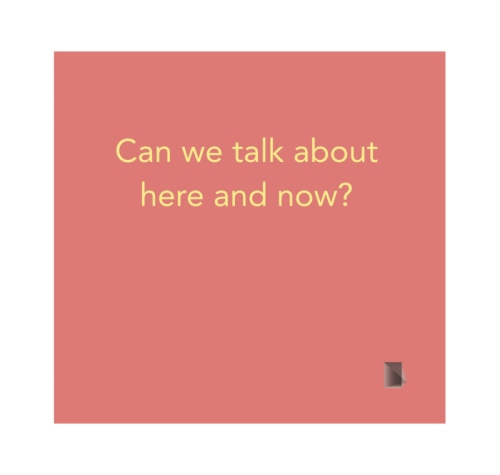
Narrative is processed from raw experience and so it is more easy to deal with than the complex mass of experience.
Harnessing Anonymity
The internet offers you a morphing cloak – you can be selective about your identity, you can be online with selective vision and selective speech [B3]. What do you choose to see online? What do you choose to reveal? And how much? [B4] If you wear the cloak that covers you altogether, are you truly anonymous, or could it be that your true self leaks out as you put your hands against your eyes in an attempt to hide yourself?
Think about a day when you want to say something and you feel that the Internet feels like too distant a medium. The Internet is so close to us, so intertwined in our lives that the perception of distance feels like a make-believe construct.
Anonymity has potential to offer a voice to the invisible identity, the silenced perspective, the overlooked persona, the taboo desire. Could it also be harnessed for accessing and expressing that which is experienced in the present? Could anonymity be that filter which stands with the least amount of obstruction to experiencing the present as it unfolds, does it offer that means to experience more freely?
Why are you online? What are you looking for online? What do you see? How does a visually impaired person experience the internet? What does that feel like? And then, what do you say online?
From awkwardness and discomfort as the minimum level of experience, we are moving to anger, disinterest and boredom [B5]. This social reality is being exacerbated by the manifestation of our realities on the internet. Anger is a mode of communication that rejects existing content in the pipeline and allows a relentless push mode of transmission. Disinterest is a lack of empathy that we are privileged to employ, while, at the same time, displacing and dismantling existing systems of falsehood and decay that are populating the system. Boredom is disengagement that comes from an immunity to words that dont mean anything – floating in the air, timed to music or masquerading as knowledge.
If we keep an open mic near a flock of passionate birds, will the flapping and other sounds become a cacophony to form an interesting soundscape? Do birds become conscious of an open mic?
Surfatial works for the frustrated seeker, seeking nourishing clarifying content on the internet. Theinternet has become a shopping mall, but this doesnt mean that we cant walk around and talk to people.
What to do? How to act? What to produce? What should the lost and wandering tribes of the world do to express with diversity? Is there some secret pathway to knowing what to do that is only accessible to deviants?
Production means to render an output, from the flux that we encounter in our experience. We can also choose not to produce but then we end up with a mass of material and no narrative.
Does deviation from the norm guarantee some kind of clarity? Why cant ordinary people know? Why dothey have to be inspired and awakened and creative to know? Is there nothing that flows in the narrow channels of propriety?
Deviation does guarantee a unique pool of content being made for us to access. But the question ishow this access is setup for a kind of secondary process – one that is possible only after the ordinary has been dealt with and has led to something. Deviant content leads us further away from the sugar-coated annals of the plain world that is meant for mass-consumption.
We live in echo chambers online and off. An infrastructure needs to be in place for the flow of a lubricant[B6] within echo chambers so that the conversation in the closed loop becomes smooth enough, and when a disassociation from the self or a disparate viewpoint happens, it is less painful. The echo-chamber becomes the social space when multiple levels of echoes are able to inter-mingle in ambiguouscontexts and containers.
If we were not productive beings we would not be able to deal with ourselves. We would be strangers to our own legacies.
Spaces for Speculative Content Production
Surfatial offers an online stage for self-enactment, where there can be friction without producing sparks. As a producer of assembly line infrastructure around access to knowledge, we find denial very useful. Denial of identity, denial of social constructions, denial of expected modes of speaking in conversations. We find that we create even the room for conversation around the need for alternatives after allegiances have stopped being in existence.
The internet is not a pool, it is a cesspool. Everyone who is trying to navigate the space feels stuck and lost. So we avoid navigation and jump from node to node in order to escape from the boiling cesspool that gets too hot if we remain in the same place for a long time.
When the shadows of dependencies on systemic corruptions have disappeared the real possibility of ‘being’ arises. We care about this possibility. We are making access to knowledge universal, since access based on the question of privilege and capacity sets a very low bar for conversations in terms of what is allowed to be spoken, which directions of verbal exploration are politically acceptable, and who gets to abuse whom with which epithets. We are concerned with formats that are open to every participant’s perspective equally and their individual approach to contributing to the collective voice.
The play never ends. Laugh at yourself
Seek a new denial… the shift of power is a natural process.
Anonymous and pseudonymous forms of content production offer a method for exploring and expressing with a certain degree of freedom. How free we feel depends partly on how free we are allowed to feel [B7], and depends in equal parts on the level of our own disinhibition. Through degrees in the opening up, passionate potentialities are demonstrated.
Who are you? And who are we? We do not know, we are nobody at all sometimes and then we wake from our slumber and feel like doing something again.
Anonymity is a double edged sword. Can virtual freedom of expression lead to any insight that can transfer into real life interaction? How difficult is this jump from virtual to real life? Virtuality has evolved beyond the world of simulation, where it is now possible to experience multiple mechanisms of meaningful relationships with people. We believe there is a level of balance between virtual and physical engagements that can be struck in order for bringing one closer to a semblance of self-realisation.
Why do players choose anonymity, if they do? Fake profiles sometimes are an expression of a desire toplay. Those who play can succumb to joy. Joy becomes a tempting emotional state. The more joyful you are, the more comfortable you feel in any garb. This could be a liberating experience, when the blurring of identities occur.
“Putting aside the baggage of ego and identity has a freeing effect on which part of our persona weexpress.”
— Mithya J., a fake profile on Facebook.
Harnessing pseudonimity
Being playful becomes possible if role-play and make-believe are accepted as valid forms of narrative ploy with a functional purpose in the everyday. The role assumed during play sometimes becomes more enjoyable than the dry person of absolute dimensions. As the rules of play are adopted, disassociation and immersion happen. The player has a choice to deny their outside-play persona and remain fully entrenched in the dynamics of play. This denial helps in the player’s engagement with our system of accessing knowledge. If the gravity and consciousness of your plain existence is lost, then communicating with you becomes easier. In short, your shadow becomes what you could never become. The being and presence of your playtime persona are much stronger than what you can ordinarily muster.In our space, you get to deny the world outside play and conversely render your world as play.
“being fictional is you without your physical being. If we take away the physical beings from this world, we are left with imagination, ideas and their interpretations.”— Raavi Georgian, a Facebook user.
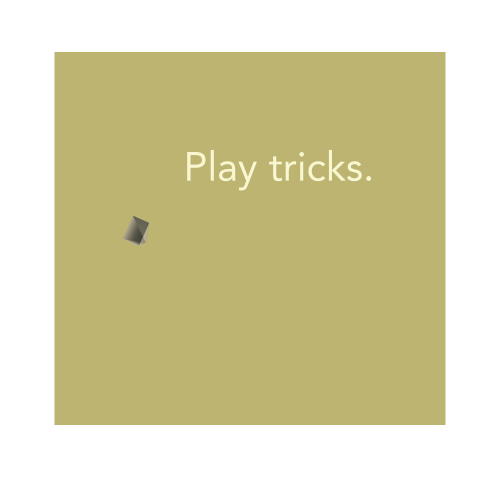
The garb of comedy allows you to listen with a certain distance. The Indian internet landscape is no stranger to this choice of presentation. Several personas dot the scene, there is Norinder Mudi, there is Gabbar Singh or the Cows of Benaras. In an era of cathartic sharing, where all manner of mental chatter finds channels of expression, comedy can be a balm for controlled experiments in taking potshots at sociopolitical power structures. Some platforms incentivise identity in order to legitimise the online experience, for instance, Facebook seems to place a premium on profile pictures by giving them a default public setting, and the user-base is advised by sundry guidelines about the “perfect profile pic” to adopt clear frontal images for maximum effect. Others have a policy of anonymity, like Reddit.
Forget who you are. Just be someone else.And then you can be the one,Holding the mic in your hand.
The existing mechanism of algorithms make it seem like there is free and open access to information, even customised for the user’s convenience. But this customisation in fact filters information based on working out the user’s bubble. One way to beat the bubble is to role-play. This would require receivers to adopt pseudonymous/ alternate roles to have access to content outside of their own filters. A loosening of the self can expand the algorithm.
Loosening of the self is a safe idea. The ideal is to have no cognisance of one’s identity. The networkconverts you into an IP – an anonymous VPN blurs your IP, nobody knows who you are. Behaviours found in the online community show that there are several aspects of blurring in identity and the presentation of information.
Harnessing disinhibition
Disinhibition is not necessarily rendered as a condition of the external ecosystem (physical and virtualecosystems). It has more to do with the actor’s persona and how she has framed and declared her persona. What is the pitch of the actor’s voice? What does it say? What kind of response becomes necessary?
The opportunity for denial emerges from the confidence gained from play. If random social play does notcause huge rescissions of norms and contracts already in place, its extension to become a fundamentalbehavioural pattern changes nothing.
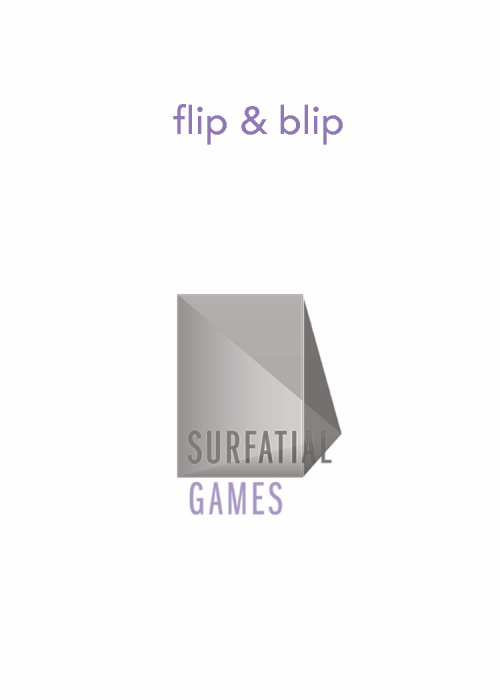
Surfatial designed a conversation game called flip & blip [A2] which has the objective of enhancing empathy and sociability, via role play and assuming personas. The purpose of role-play is to help people step put of themselves and play out situations through alternate lenses. In any situation, how does another feel? [B8] We are either intuitive, or we are clueless. This game opens up the space between. It uses question cards and persona cards as triggers to present scenarios to the players. The goal was to have a conversation while wearing a persona, and then to have the same conversation while being oneself. The players then reflected on the occurrence of any shifts in perspective during this process [B9].
A game is a format for play that has rules [B10]. Even while these rules are very important, sometimes it becomes possible to play with them. The extent to which we enjoy the game depends on our interpretation of these rules. Now, socially acceptable rules of conduct are considered to be good behaviour. And if our physical social lives are viewed as some kind of a game with rulesets and interpersonal protocols of engagement (a game with heavy consequences for not playing by the rules), perhaps our online lives offer that outlet for exercising freedom from this oppressive structure, and perhaps the freeing online experience can translate into incorporating playfulness into strict routine interactions?
“Human social structures built upon transactional attitudes dont have space for free expression, since free expression means disregarding façades and notions of “propriety” as well as hierarchy”— Mithya J., a fake profile on Facebook.
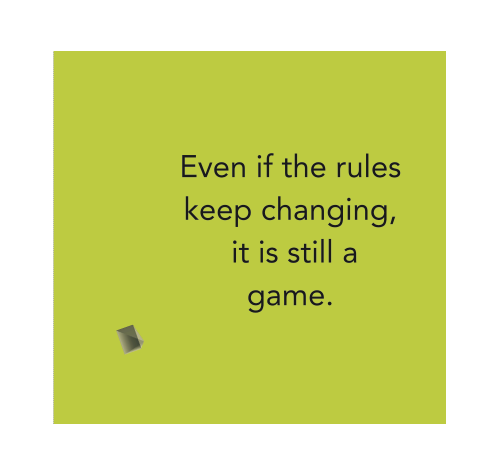
Access might supposedly require a filtration system. But we are opposed to the construction and use of filters. We are of the opinion that we need to be able to access the core content directly – no envelopes, no braces, and no reduced-sets. People fear dealing with the naked world because they fear engagement, immersion and getting overwhelmed, while at the same time craving first hand knowledge, craving a removal of gatekeepers who shield them from the naked truth using agenda-coloured filters.
Surfatial has been working with several formats for harnessing anonymous content production and for playful engagement, via our structured study groups that actively discourage the elaboration of direct personal identification. The emergence of individual identities occurs only through the exchange of perspectives during conversation [B11].
The study group derives itself from a group of individuals who are interested in remaining sharp as a group. The group’s concern will always be to aid others as well as itself by challenging every perspective that seems superfluous.
Our study groups
Our study groups [A1] are webinars hosted on Google Hangouts on Air, with a framework of philosophical questioning and a self-reflective exchange of individual experiences. These are structured conversations that are completely open to participation and listening, with one to three anchors. Each study group is centred around a topic, and three pre-determined questions relating to that topic are posed to the participants. The tone is detached, with not much encouragement for sharing of personal information. The conversation is fluid and anyone who has anything to say is able to start speaking. We do not follow the common conventional etiquette of introducing the guests or apologising for intrusion. Due to this it becomes rather freeing and divorced from any mode of social behaviour. The illusion we often chase is of the study group being just a set of “voices in the head”.
When an idea oversteps the terrain that it has been assigned to, it acquires the garb of being a trespasser. Ideas trespass when they uncover surprising connections. which they might otherwise not be related to in any direct way. Such connections cannot be predicted. They emerge out of the process of exploring something else. Trespass happens at perspective boundaries—one never meant to hear another’s perspective, but now that they are in a space together, one must; encroachment will invariably happen.
Study groups have anchors who stand with markers for conversation transition points. Anchors could be Surfatial members or guests. Guest anchors are invited with the intent of extending Surfatial’s sphere of engagement and to alter the threads that connect the conversations.
Anchors are not moderators. They are literally anchors for the discussion. They make sure that the discussion deals with the issues that it raises before moving onto other issues. Anchors seek out questions and figure if they have been answered. They are like accountants of a currency of ideas.
The archive of all these study group conversations [A8] is treated as a dynamic space for re-engagement in order to consistently pursue alternate methods of presenting it—through text, posters, books, soundtracks, videos and conversation games.
How messages are presented
When we start seeding a message, we feel the pull of invisible attractors. The vestiges of messages are either offered at their face value or they are so thin, light and loosely packed that they do not offer sufficient flesh to sink teeth into [B12]. The least we demand from the producers of noise and meaninglessness in our environment is that they give us sufficient depth of material to bite into and suck the juice out. Density is the key.
In compression lies our only hope. If you have to speak, speak less and mean more. If you have to produce material of any kind, make sure it is densely packed with fissile material which can all combust together to yield a message.
By packaging our formats in diverse forms they become appealing to people in different ways.
But there is a danger of package and content being divorced in the process of design. Design facilitates skimming of content by packaging its appearance as eye-candy; packaging runs the danger of dissuading immersion into content. We look to destabilise this tendency, and offer value in the packaging itself. We are interested in packages with embedded content, to save the viewer the trouble of unwrapping any external cover.
Access to free exchange is sometimes denied. Free exchange ensures that ideas get modified and challenged. They grow and so it is an essential process that is needed in order for them to be change and offer strength garnered from this free exchange.
Then what is the way? How do you get past institutional filters? If limits have been drawn, if the surfaces of knowledge are guarded, how do messages get out of the perimeter of control? Spam—unsolicited communication, yielding messages where none are requested or expected—is the answer. Spam and spam-like methods are the only tools that can get past the filters. There are no constraints which are fine enough for the fine specks of spam to be swatted out.
We are going to populate compressed messages of the whole worlds knowledge onto surfaces of mass display and then circulate them like spam.
Posters [A9] are posts that linger [B13]. Posters are not just lozenges of information, they are pieces and fragments of a song that gets completed in the reader’s mind. The poster is already present on social media as a format. But not all designers use the poster in the same way. For some it is just a clever punch-line. We believe in the punch but not in the merit of clever punch-lines. We attempt a sharp contrast between the text that we write and the general experience offered by the environment for consumption of media. This sharp contrast is conveyed through our choice of the posters’ visual format as well as through the auditory means of a soundscape.
What is a song? Who is singing? A song speaks when words are weak, when humming gets through, when drumming has no beat.
Our tracks [A7] emerge out of our words and texts. We put together sounds and speech sometimes post-fact, sometimes in the moment with everyone there in the room. We believe that fragments of words and speech can be agents of perspective shifts if placed within altered contexts and rhythms. We think of our sounds as soundscapes more than music.
Conversation as Currency
To sell, one needs to be invisible. No business survives on recurrent sales to family and friends. Businesses survive and grow because they create markets within which strangers can transact with confidence. For strangers to transact with confidence, value needs to be stable and fixed into the form of the product. And for that, products need to develop an intensely tangible form. Value of the product starts and finishes with the form. The form cannot be soft or intangible. It needs to be concrete.
To fix the value for a thing, one needs to have a conversation. The price of a commodity can be arrived at through conversation. But we do not care about the price. Because once we sell, our conversation is over. We do not want to end it. Besides, we will all keep having more to say and would like others to have access to it too. These are things of value for all of us. This is what we want to exchange and so, conversation is our currency. We will only transact through conversations.
To buy, one must be desirous. There must be a desire for change, for a perturbation of the status quo. A desire that drives motivation for the mouth to open and the hand to move towards a device that dispenses currency. All this takes a lot of effort. The seller and the buyer both have desires and motivations, but the anxiety of the approach to the final push off of the cliff-face of the mountain of the transaction must be overcome. This is the difficult part. It involves a leap of faith. Can a push be made as effortlessly as possible? Sure. We only need to find a way. Efficiency is a way. We introduce efficiency into the system by reducing steps. If we take away the step of the hand moving, we have already reduced effort. Now only the mouth has to open.
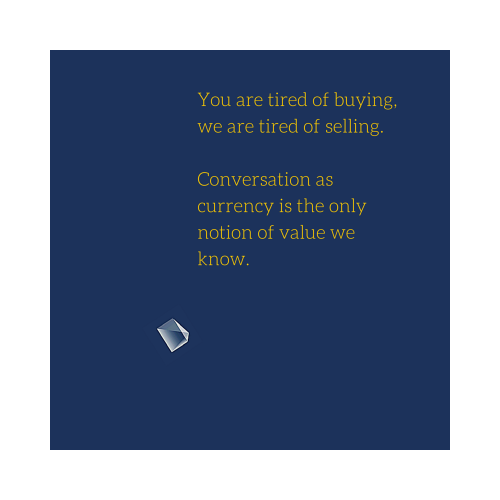
We have made the determination of value into a game, which is in the form of a Book of Conversation Triggers [A3]. In this game, we will read each sentence in our book to you and we will ask you if you agree. After we have performed all the sentences to you, we will ask you if you feel like holding on to any sentence, or if any sentence led you to experience a new kind of thought. If you think so, we will offer those sentences to you. You may if you like, in turn play this game with whomever you choose to play it with, in order to have another conversation. You owe yourself that much at least. If conversation is a currency, it wants to grow and spread like a virus. So, why not go forth and multiply?
What will you, the player, win? You win a sentence you can post on your fridge door or your Facebook wall, you win an insight you can talk about further. You win the memory of a delightful conversation you had with us, which we guarantee you will have again with whomever you choose to play with. This game will give you victory again and again. Are you game?
A poster can also be a person who posts. A post-writer is often one who reaches the point of saturation, which pushes them to producing compressed text. This act places them in a new period in the timeline of history, of being post-writers.
Publishing sans credits
We work with the idea of credit-less production. post_writer [A5] is a twitter-based monthly journal. Each issue consists of six tweets. Four by humans, one by a bot and one by a sponsor. There are only issue-wide credits but no individual credits. Which tweet is by whom is an ambiguity.
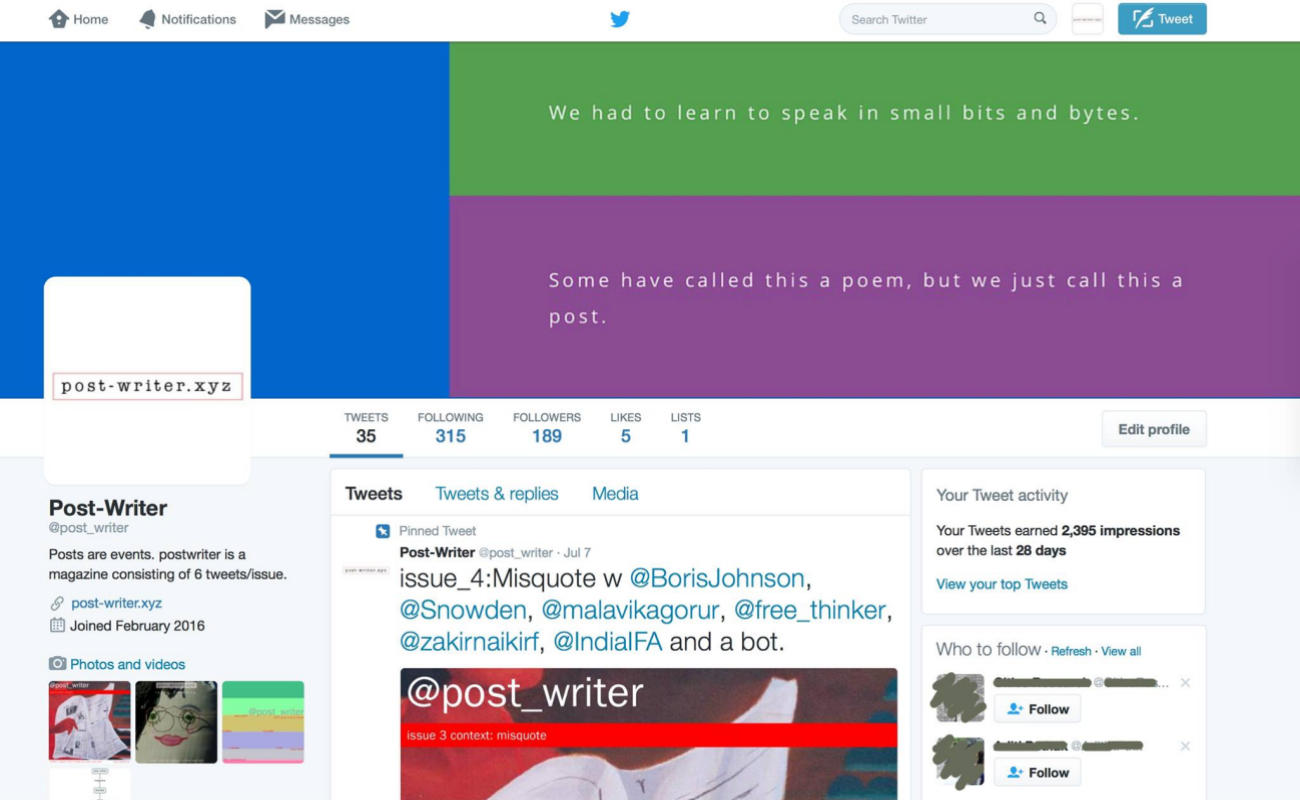
As an actor, you can choose to disengage from every story you assume you are a part of, then you deal with the anxiety of performing for free in an under-documented and under-credited fashion. When this anxiety subsides, awakening might happen.
We look to expand the study group format to have anchors interested in exploring their own questions in a nondescript manner. We are also looking at shorter capsules of study groups which will be podcast, with a question dedicated for an individual’s consideration, to capture their particular perspective of experience sharing.
We would rather model the world as a space swarming with individuals who actively produce content, rather than as a space with an abundance of consumers and a scarcity of commercially viable producers enveloped in the gloss of the culture of page-hits and celebrity [B14] [B15]. Today we have a competitive marketplace of market-validated content that goes into profiling our consumption. Our profiles are then further recycled as fodder by the market, to be fed back to us [B16]. We are not valued as producers; we are valued as consumers of products, and vessels for marketing those very products.
The current state of the world has many different sources of validation but does not have a space for the self-validated. If we choose to be blind to the sociality of the content we see, then we have nothing at all. Every package of content is socialised, everything is floating in mediated space [B17]. The isolated, untouched (by mind or hand) content has no place in the world. We are surrounded by content which has no fidelity, coils through minds at will, and yields their message to anyone who enquires. There is no knowledge personally reserved for you in this pool of content. Reading is supposed to lead to synthesis and this synthesis is meant to culminate into a development of personal perspectives and opinions. However, in a pool of commonly read content there is more likelihood for the development of cliques and clouds of common belief and little space for individualised synthesis. Some get hit more directly by some threads of content and identify the hit as a personal facet of discovery.
“The smart way to keep people passive and obedient is to strictly limit the spectrum of acceptable opinion, but allow very lively debate within that spectrum….”— Noam Chomsky, The Common Good
To hit upon a truly personal facet of content that doesn’t belong to a popular cesspool, a flow of production has to be initiated and self-validated. Entire knowledge-systems need be constructed without any building blocks but with content generated from the knowledge of the moment [B18]. Insights gleaned from here and there come together as a granular pool of content that is personal, special and hitherto unseen in our context. A unique association between the individual and message gets formed. And this association is incoherent and unfamiliar in ways, because it doesnt belong to the popularly socialised frameworks of knowledge. This weird fiction gets overlooked and thereby remains safe from being intruded upon or being misconstrued. The obscure and the hidden breed mysteries waiting to be tapped.
Time to break [B19] from packaged commodified sound byte capsules.
A) Index of Surfatial Projects
1. Study groups on Google Hangouts on Air
- Study groups with Surfatial anchors
- Study groups with guest anchors
2. Conversation based games: flip & blip
3. Book of Conversation Triggers: PDF
4. Online Residency on Surfatial’s Facebook page
5. Post-writer: https://twitt
Related Events
Sorted By DateTelecom
Judicial Trends: How Courts Applied the Proportionality Test
This is the second in a series of essays aimed at studying the different ways in which apex courts have evaluated national biometric digital ID programs of their countries.
Event
23 March 2024Access to Knowledge
Information Disorders & their Regulation
The Indian media and digital sphere, perhaps a crude reflection of the socio-economic realities of the Indian political landscape, presents a unique and challenging setting for studying information disorders.
Event
5 MBDigital Cultures
Security of Open Source Software
A Survey of Technical Stakeholders’ Perceptions and Actions
Event
2.5 MBAccess to Knowledge
Global Accessibility Awareness Day 2017
The Centre for Internet & Society along with Prakat Solutions and Mitra Jyothi is co-hosting the Global Accessibility Awareness Day in Bengaluru on May 18, 2017.
Event
18 May 2017